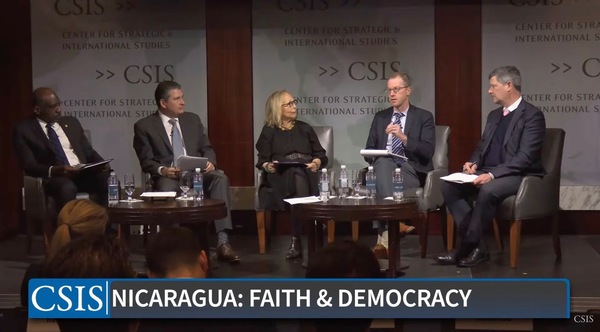In Washington D.C., on December 1, 2023, the CSIS Americas Program and the CSIS Project on Prosperity and Development, in partnership with the Keough School of Global Affairs and Pulte Institute, organized "Democracy and the Catholic Church in Nicaragua," an event focusing on democratic backsliding in Nicaragua and the role of the Catholic Church and faith-based society.
Notre Dame President Rev. John I. Jenkins, C.S.C., provided opening remarks via video, followed by a panel discussion featuring Pulte Institute Senior Researcher and CARA (Central America Research Alliance) Co-Director Tom Hare.

The event also featured Juan Sebastián Chamorro, Nicaraguan economist and former presidential candidate; Archbishop Timothy P. Broglio of the U.S. Archdiocese for the Military Services and president of the U.S. Conference of Catholic Bishops; Christopher Hernandez-Roy, deputy director and senior fellow of CSIS’ Americas program; Maura Policelli, executive director of Notre Dame’s Keough School of Global Affairs; the Rev. Frederick Davie, vice chair of the U.S. Commission on International Religious Freedom; Rosalía Miller, president of the U.S.-based nonprofit Nicaragua Freedom Coalition; and Christopher Hernandez-Roy, CSIS's Deputy Director and Senior Fellow, Americas Program.
In his video message, Rev. Jenkins said that Ortega’s “attempt to extinguish Catholicism in Nicaragua merits global condemnation on a much larger and louder scale” and that “his regime should be isolated as an international pariah for trying to disappear Catholic institutions, freedom of worship and freedom of expression.”
Hare served as a voice for Nicaraguan researchers and scholars, who avoid publishing condemnations against the regime for fear of Ortega-sponsored persecution and attacks — which can happen even to researchers in exile. He shared a warning from his Nicaraguan colleagues — many of whom are former researchers at the Universidad Centroamericana, the most important private institution of higher education in Nicaragua, which was seized by the Ortega regime last August.
Nicaraguan researchers asked Hare to convey that “the threats to democracy are spreading in the whole region and are especially strong where religion and freedom of expression intersect.” Equally important to an international response to Nicaragua are efforts by the global community “to prevent this contagion from continuing,” says Hare, "especially in El Salvador and Guatemala."
Hare shared a policy brief titled, "Violations of academic freedom are violations of human rights in Nicaragua: A plea from researchers under attack," written in co-authorship with CARA members Rafael Rubio (Universidad Rafael Landívar), Estela Rivero (Pulte Institute Senior Researcher and CARA Co-Director), and Carlos Arenas (Pulte Institute Research Communications). The brief outlines the life and career-threatening challenges faced by Central American researchers in the context of state repression against academic freedom in independent institutions of higher education, human rights agencies, and research centers.